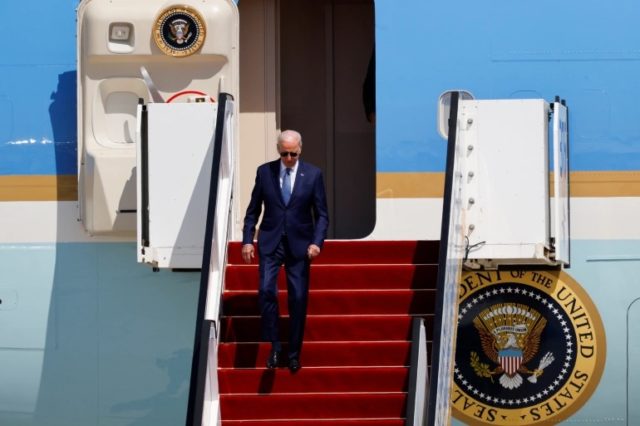As President Joe Biden left for his trip, State Department spokesman Ned Price told reporters, “Secretary of State Antony J. Blinken will accompany President Biden to Israel, the West Bank, and Saudi Arabia July 13-16 to consult with Israeli, Palestinian, Gulf and regional partners on a range of priorities, including deepening U.S. ties across the region, regional security, support for a two-state solution.”
Before he meets with Palestinian Authority (PA) strongman Mahmoud Abbas on Friday, Biden should be aware that Abbas has already rejected the notion of “normalization” of relations between the PA, Israel and the Arab States, nixing the principle of accepting the State of Israel, i.e., nixing a solution ending in two states.
President Biden is stuck in a past that never had much chance of success, but now has less. How can you tell? The Arabs are telling you that the PA is a corrupt and malign influence in the region, their priorities are something else, and the greatest threat to their future is Iran. Oh, and by the way, the Gulf States are demanding something entirely else from Washington.
Start with the last one.
Abd Al-Khaleq Abdallah, a researcher with the Arab Gulf States Institute in Washington, and considered close to UAE President Sheikh Muhammad bin Zayed Al-Nahyan, wrote a letter that was published by CNN Arabic last week (courtesy of MEMRI):
“The Gulf states … have their own geopolitical interests and considerations … including their aspiration to deepen and expand their ties with other world powers. If the U.S. does not respect this … the Gulf states will not be able to establish a strategic partnership with it … President Biden must realize that the Arab Gulf has changed,” it said.
“Other world powers” can be a threat — meaning Russia and China — or it could mean Israel. That is not a position that places Palestinians and their aims at the center of diplomacy.
In fact, the Arab states no longer provide aid — or the sort of practical help that Bahrain and UAE used to provide in terms of jobs and financial support. PA Prime Minister Mohammad Shtayyeh recently revealed that only Algeria among the Arab States continues to send money to the PA treasury. In addition, journalist Khalid Abu Toameh reported that “Arab financial aid to the United Nations Relief and Work Agency for Palestine Refugees (UNRWA) has dropped by 90% in the past few years, according to the agency’s spokesperson Adnan Adnan Abu Hasna.”
Since the West Bank economy is notoriously corrupt and unresponsive, it is now largely dependent on the EU, individual European countries and the U.S. for money. And the U.S. has responded. Despite the bipartisan Taylor Force Act, which prohibits American funds from going to the PA while the Palestinians pay “salaries” to terrorists, the 2021 State Department budget included $360 million in U.S. taxpayer dollars for West Bank and Gaza activities, channeled through international organizations as a work-around.
Analyst Maurice Hirsch reports that the U.S. commitment is considered insufficient by Abbas, who intends to demand that Mr. Biden renew direct aid. This comes as hundreds of Palestinian terrorist prisoners have received or are about to receive a rise in salary from the PA. Any aid violates the spirit of Taylor Force, and direct aid would violate the letter of U.S. law.
Other Abbas “requirements” for a meeting with Biden include:
- reopening the U.S. consulate in Jerusalem;
- removing the PLO from the U.S. list of Foreign Terrorist Organizations;
- reopening the PLO mission in Washington which was closed during the Trump administration.
The U.S. delegation, from the president down, would do better to pay attention to the report from a Palestine Center for Public Opinion poll of Palestinian Arabs. Those in eastern Jerusalem were a surprise for some:
“Today, half (48%) of the city’s Palestinian residents say that, if they had to make a choice, they would prefer to become citizens of Israel, rather than of a Palestinian state. From 2017 to early 2020, that figure hovered around just 20%. Today, only a minority (43%) of East Jerusalemites say they would pick Palestine, while the remainder (9%) would opt for Jordanian citizenship,” the center found.
They wouldn’t be a surprise to the Gulf Arab States.
The president will have to choose between his historic belief in the “2-state solution” and the future that forward thinking regional countries — including Israel — project for themselves.


